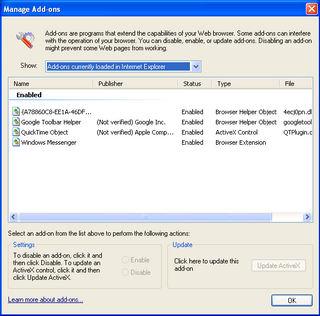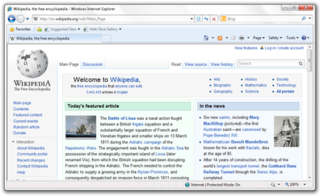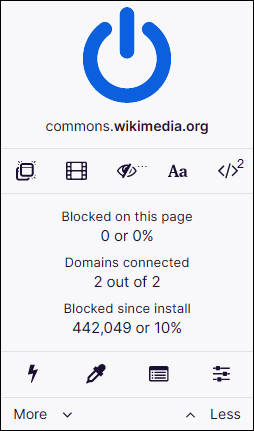
Internet Explorer is a retired series of graphical web browsers developed by Microsoft that were used in the Windows line of operating systems. While IE has been discontinued on most Windows editions, it remains supported on certain editions of Windows, such as Windows 10 LTSB/LTSC. Starting in 1995, it was first released as part of the add-on package Plus! for Windows 95 that year. Later versions were available as free downloads or in-service packs and included in the original equipment manufacturer (OEM) service releases of Windows 95 and later versions of Windows. Microsoft spent over US$100 million per year on Internet Explorer in the late 1990s, with over 1,000 people involved in the project by 1999. New feature development for the browser was discontinued in 2016 and ended support on June 15, 2022 for Windows 10 Semi-Annual Channel (SAC), in favor of its successor, Microsoft Edge.

A Browser Helper Object (BHO) is a DLL module designed as a plugin for the Microsoft Internet Explorer web browser to provide added functionality. BHOs were introduced in October 1997 with the release of version 4 of Internet Explorer. Most BHOs are loaded once by each new instance of Internet Explorer. However, in the case of Windows Explorer, a new instance is launched for each window.
This is a comparison of both historical and current web browsers based on developer, engine, platform(s), releases, license, and cost.
Mozilla Firefox has features which distinguish it from other web browsers, such as Google Chrome, Safari, and Microsoft Edge.

Windows Internet Explorer 7 (IE7) is a web browser for Windows. It was released by Microsoft on October 18, 2006, as the seventh version of Internet Explorer and the successor to Internet Explorer 6. Internet Explorer 7 is part of a long line of versions of Internet Explorer and was the first major update to the browser since 2001. It was the default browser in Windows Vista and Windows Server 2008, as well as Windows Embedded POSReady 2009, and can replace Internet Explorer 6 on Windows XP and Windows Server 2003, but unlike version 6, this version does not support Windows 2000, Windows ME, or earlier versions of Windows. It also does not support Windows 7, Windows Server 2008 R2 or later Windows Versions.

Adblock Plus (ABP) is a free and open-source browser extension for content-filtering and ad blocking. It is developed by Eyeo GmbH, a German software company. The extension has been released for Mozilla Firefox, Google Chrome, Internet Explorer, Microsoft Edge, Opera, Safari, Yandex Browser, and Android.

Microsoft developed 11 versions of Internet Explorer for Windows from 1995 to 2013. Microsoft also developed Internet Explorer for Mac, Internet Explorer for UNIX, and Internet Explorer Mobile respectively for Apple Macintosh, Unix, and mobile devices; the first two are discontinued but the latter runs on Windows CE, Windows Mobile, and Windows Phone.
NoScript is a free and open-source extension for Firefox- and Chromium-based web browsers, written and maintained by Giorgio Maone, a software developer and member of the Mozilla Security Group.
A browser extension is a software module for customizing a web browser. Browsers typically allow users to install a variety of extensions, including user interface modifications, cookie management, ad blocking, and the custom scripting and styling of web pages.
A browser toolbar is a toolbar that resides within a browser's window. All major web browsers provide support to browser toolbar development as a way to extend the browser's GUI and functionality. Browser toolbars are considered to be a particular kind of browser extensions that present a toolbar. Browser toolbars are specific to each browser, which means that a toolbar working on a browser does not work on another one. All browser toolbars must be installed in the corresponding browser before they can be used and require updates when new versions are released.

Windows Internet Explorer 8 (IE8) is the eighth and, by now, discontinued version of the Internet Explorer web browser for Windows. It was released by Microsoft on March 19, 2009, as the successor to Internet Explorer 7. It was the default browser in Windows 7 and Windows Server 2008 R2.

Web development tools allow web developers to test, modify and debug their websites. They are different from website builders and integrated development environments (IDEs) in that they do not assist in the direct creation of a webpage, rather they are tools used for testing the user interface of a website or web application.

Internet Explorer 9 or IE9 is the ninth version of the Internet Explorer web browser for Windows. It was released by Microsoft on March 14, 2011, as the ninth version of Internet Explorer and the successor to Internet Explorer 8. Microsoft released Internet Explorer 9 as a major out-of-band version that was not tied to the release schedule of any particular version of Windows, unlike previous versions. It is the first version of Internet Explorer not to be bundled with a Windows operating system, although some OEMs have installed it with Windows 7 on their PCs. Internet Explorer 9 is the last version that is called Windows Internet Explorer. The software was rebranded simply as Internet Explorer starting in 2012 with the release of Internet Explorer 10.

MicroB was a mobile web browser developed by Nokia for use in smartphones and mobile devices that run the Maemo operating system. The browser is Mozilla-based and uses the Gecko layout engine.
Web Slices are a web feed technology based on the hAtom Microformat that allows users to subscribe to portions of a web page. Microsoft developed the Web Slice format, and published a specification under their Open Specification Promise. The specification is not published by any independent standards body. Introduced in Internet Explorer 8 Beta 1, Web Slices can be previewed in a fly-out window. As of 2012, Internet Explorer 8 and 9 were the only browsers to support Web Slices natively, although Mozilla Firefox had support via an add-on called webchunks.
AdBlock is an ad-blocking browser extension for Google Chrome, Apple Safari, Firefox, Samsung Internet, and Microsoft Edge. AdBlock allows users to prevent page elements, such as advertisements, from being displayed. It is free to download and use, and it includes optional donations to the developers. The AdBlock extension was created on December 8, 2009, which is the day that supports for extensions was added to Google Chrome. It was one of the first Google Chrome extensions that were made.
An Internet Explorer shell is any computer program that uses the Internet Explorer browser engine, known as MSHTML and previously Trident. This engine is closed-source, but Microsoft has exposed an application programming interface (API) that permits the developers to instantiate either MSHTML or a full-fledged chromeless Internet Explorer within the graphical user interface of their software.

Internet Explorer 11 (IE11) is the eleventh and final version of the Internet Explorer web browser. It was initially included in the release of Windows 8.1, Windows RT 8.1 and Windows Server 2012 R2 on October 17, 2013, and was later released for Windows 7 and Windows Server 2008 R2 on November 7, 2013. It is the successor to Internet Explorer 10, released the previous year, and was the original, default browser in Windows 8.1 and Windows Server 2012 R2, before Microsoft Edge was introduced. Internet Explorer 11 was also included in the release of Windows 10 on July 29, 2015, as well as in Windows Server 2016 and Windows Server 2019. On April 16, 2019, Internet Explorer 11 was made available to Windows Server 2012 and Windows Embedded 8 Standard, the only still supported edition of Windows 8 as the final expansion of Internet Explorer 11 availability. Internet Explorer 11, like its predecessor, is not available for Windows Vista, Windows Server 2008 and earlier versions of Windows and Windows Server.
Browser security is the application of Internet security to web browsers in order to protect networked data and computer systems from breaches of privacy or malware. Security exploits of browsers often use JavaScript, sometimes with cross-site scripting (XSS) with a secondary payload using Adobe Flash. Security exploits can also take advantage of vulnerabilities that are commonly exploited in all browsers.

uBlock Origin is a free and open-source browser extension for content filtering, including ad blocking. The extension is available for Chrome, Chromium, Edge, Firefox, Brave, Opera, Pale Moon, as well as versions of Safari prior to 13. uBlock Origin has received praise from technology websites and is reported to be much less memory-intensive than other extensions with similar functionality. uBlock Origin's stated purpose is to give users the means to enforce their own (content-filtering) choices.










